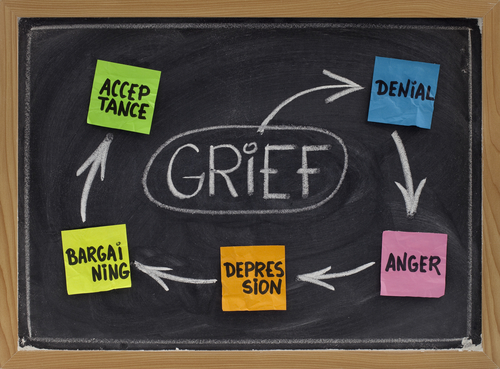
Grief: Why is mine still unresolved?
It becomes crucial that mourners know the facts of normal grief while struggling with complicated grief.
Grief is a condition that we will all experience. Helen Nieves guides us through grief’s twists and turns.
(What is Complicated Grief? Helen Nieves, LMHC, ADC-C.psychcentral.com/mental-health-awareness/2014)
Normal Grief:
- Accept the Loss, face reality that the death happened and the person will not come back.
- Process the Pain of Grief, acknowledge and work through one’s pain.
- Adjust without the Deceased,
External adjustment, Come to terms with being alone.
Internal adjustment, “Who am I now?”
Spiritual adjustment, Search for meaning and its life changes in order to make sense and regain control of one’s life.
- Live effectively in the world by finding a place for the deceased in your emotional life. Find ways to remember the deceased without it getting in the way of continuing one’s life.
(Worden, Grief Counseling and Grief Therapy: A Handbook for the Mental Health Practitioner, 2009)
Complicated Grief:
Complicated mourning, unresolved grief, chronic grief, or delayed grief are some of the names given to describe complicated grief.
Here, a person is overwhelmed, resorts to maladaptive behavior, or remains interminably in the state of grief without progression of the mourning process towards completion such as:
1) Persistent, intense yearning or longing for the deceased
2) Frequent feelings of intense loneliness or emptiness
3) Recurrent negative thoughts about life without the deceased or recurrent urge to join the deceased
4) Preoccupying thoughts about the deceased that impair daily functioning
8 factors impeding the mourning process and good adaptation to loss:
| 1) Rumination about circumstances of the death2) Frequent disbelief or inability to accept the death | |
| 3) Persistent feeling of being shocked, stunned, or emotionally numb since the death4) Recurrent feelings of anger or bitterness regarding the death
5) Difficulty trusting or caring about others since the loss 6) Experiencing pain or other somatic symptoms the deceased person had, hearing the voice of the deceased, or seeing the deceased person 7) Intense emotional reactions to memories of the deceased |
|
| 8) Excessive avoidance or excessive preoccupation with places, people, and things related to the deceased or death(Katherine Shear, Naomi Simon, Melanie Wall, et al in a study they published in 2011 in New York) | |
Those in complicated grief desperately need professional help. The grief counselor’s role here at Counseling on Demand is to help you, the mourner find a place for the dead in your emotional life that will enable you to go on living effectively in the world.
Here’s how we would work together (Khoshaba):
Cognitive Behavioral Therapy: To resolve the death of a loved one, together, we need to examine thoughts that may be subconsciously giving you pleasure, by keeping a deceased loved one alive in your mind. We explore certain irrational thoughts around the loss. The death signifies an end of life rather than a life change, an intolerable experience rather than one that has to be managed and worked through, and a meaningless event rather than one that is full of meaning. This style of thinking actually gives as much pleasure as it does pain; thus, shutting down the possibility of getting better, which, strangely enough, subconsciously assures you, the griever, that you do not have to let go of the deceased loved one. Changing these irrational thoughts to rational ones brings the reality of the loss into full awareness that decreases yearnings and weakens the pleasure/reward cycle.
Exposure Therapy: . We work together to gradually expose you to all of the people and events that make up your life. This, along with guiding you to mark out times just for grieving. Also we suggest ways of removing excessive reminders of the deceased loved one which will do much to break habits that keep you stuck in the grieving process.
Meaning Therapy: Nothing is changed without a change in meaning. The grief process necessitates that we make sense of the death through our understandings and beliefs around death or by accommodating the loss through meanings that reorganize, deepen, and expand our understandings of ourselves so as to stand on our own.
We at Counseling on Demand understand very well that the grief process needs to be carefully worked through. It takes time and professional skill to help you to face the loss, find meanings that give you hope for the future, and to re-engage you in relationships and activities that make you want to embrace life, once again.
“Also, we are aware that the grief process can be complicated by depression, anxiety, posttraumatic stress disorder, or substance abuse. It’s best to see a professional counselor who can determine the right treatment. Sadly, some people do not get treatment and others end up taking their own lives”. (Deborah Khoshaba Psy.D, psychologytoday, September 2013)
This is why online www.counselingondemand.com is here. You need not go through this alone. With our support, you can get through these times. Much of what we do is to counsel mourners, especially those in Complicated Grief.
We can help. You needn’t leave your favorite/private place. Nor must you wait for an appointment. We are always there for you. You can begin in 24 hours or less.
You may contact us now. Your first consultation is free. Schedule one on our website.
We await your connection at “Leave a Message” found at the bottom of our website, also, “Make an Appointment” or “Contact Us” at the top, whichever works best for you.
Then we can connect via Skype, Facetime, Hangouts on your computer, cell phone, notebook or tablet- even your E-book.
We are just a click away.